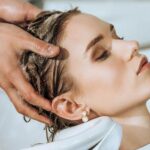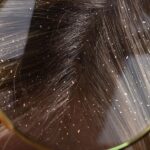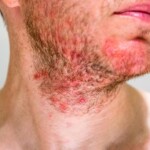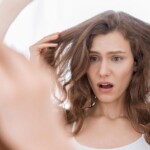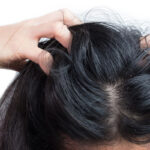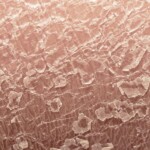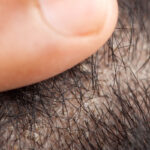On the scalp of every person, regardless of age or gender, there are yeasts (Pityrosporum ovale). These are natural microorganisms of the scalp and usually do not cause any problems on a daily basis. However, when conditions become favorable (seborrhea or overly dry skin), issues may arise. Pityrosporum ovale multiply very quickly, and the substances produced during their breakdown irritate the scalp. They cause itching and excessive flaking of the skin – known as dandruff.
Factors contributing to dandruff
The problem of dandruff intensifies mainly in late autumn and winter (when we wear hats). At that time, the scalp overheats, which leads to the secretion of sebum – creating an ideal environment for yeast. In summer, one should avoid excessive sun exposure of the head – not only is it harmful to overall health, but it also dries out the scalp, which may also result in dandruff.
The causes of dandruff are numerous – from washing the hair too often, to genetic factors, to using the wrong cosmetics. Ignoring dandruff can have serious consequences. Therefore, it is worth finding out what type of dandruff you have and how to treat it effectively. Learn more about what dandruff is in this article: Dandruff – causes, types, and treatments: home remedies.
What is the difference between oily dandruff and dry dandruff?
Yeasts feed on sebum, so when the scalp starts to become oily – Pityrosporum ovale finds a favorable environment and multiplies. This is how oily dandruff develops, creating flakes that strongly adhere to the scalp (they rarely fall onto clothing, which is why they are often noticed late), and the scalp may start to have an unpleasant odor.
When dealing with dry dandruff, it is immediately visible to the naked eye – the flakes are dry, do not stick to the scalp, and fall onto clothing. Dry skin is also very sensitive to yeast. Even small colonies can cause inflammation of the scalp, leading to itching.
Dry dandruff can also appear if we use the wrong cosmetics. For example, if the scalp is dry but we use shampoos intended for oily hair (which are designed to dry out the scalp), it is no surprise that dandruff will appear and intensify.
Other causes of dandruff
In addition to using poorly chosen cosmetics, dandruff can also be caused by mental health issues, certain medications, chronic stress, poor diet, excess male hormones in the body, air pollution, or styling hair at excessively high temperatures.
Can dandruff cause hair loss?
Dandruff itself absolutely cannot. However, seborrhea that accompanies dandruff can. It is quite dangerous, as even in young men it can cause hair loss – not necessarily complete baldness, but hair may disappear from the temples or the crown of the head.
It is difficult to completely get rid of dandruff (whether dry or oily). Dandruff can be temporarily reduced, but it often returns – sometimes with double strength. If anti-dandruff cosmetics do not bring the expected effect and the problem persists, you should see a specialist who will order tests, and select the right care and treatment plan.



